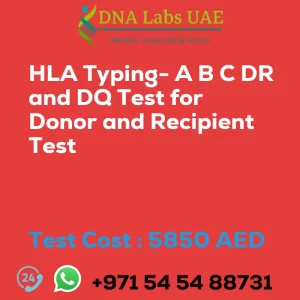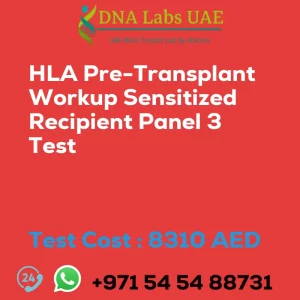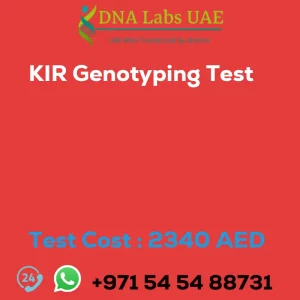HLA DSA-SAB CLASS II IgG ANTIBODIES WITH C1q SCREEN Test
At DNA Labs UAE, we offer the HLA DSA-SAB CLASS II IgG ANTIBODIES WITH C1q SCREEN Test at a cost of AED 7380.0. This laboratory test is designed to detect the presence of HLA class II IgG antibodies in the blood.
Test Components and Price
- Test Name: HLA DSA-SAB CLASS II IgG ANTIBODIES WITH C1q SCREEN Test
- Price: 7380.0 AED
Sample Condition
For this test, we require a minimum of 2 mL serum from 1 SST. Please ship the sample refrigerated or frozen. Additionally, provide a brief clinical history and HLA typing report of the donor/donors if it is a pre or post transplantation sample.
Report Delivery
The test results will be delivered within 10-12 days.
Method
We utilize Luminex X-Map technology for conducting the HLA DSA-SAB CLASS II IgG ANTIBODIES WITH C1q SCREEN Test.
Test Type
This test falls under the category of transplantation pathology.
Doctor
This test is typically ordered by nephrologists and hematologists.
Test Department
This test is conducted in our dedicated Test Department.
Pre Test Information
Please provide a brief clinical history and HLA typing report of the donor/donors if it is a pre or post transplantation sample.
Test Details
The HLA DSA-SAB CLASS II IgG ANTIBODIES WITH C1q SCREEN Test is a laboratory test used to detect the presence of HLA class II IgG antibodies in the blood. These antibodies can be produced in response to organ transplantation or blood transfusion and can lead to rejection of the transplanted organ or transfused blood.
The test utilizes a solid-phase assay called the single antigen bead (SAB) assay to detect HLA antibodies. The beads in the assay contain specific HLA antigens, and if there are antibodies in the patient’s blood that recognize those antigens, they will bind to the beads. The test also includes a C1q screening step, which helps to identify clinically significant antibodies that are more likely to cause rejection of the transplanted organ or transfused blood.
The results of the test are reported as the presence or absence of HLA class II IgG antibodies and the strength of the antibody response. A positive result indicates that the patient has antibodies against specific HLA antigens, which may increase the risk of rejection of a transplanted organ or transfused blood. This information can be used by healthcare providers to select appropriate donors for transplantation or to monitor patients for rejection after transplantation.
| Test Name | HLA DSA-SAB CLASS II IgG ANTIBODIES WITH C1q SCREEN Test |
|---|---|
| Components | |
| Price | 7380.0 AED |
| Sample Condition | 2 mL (1 mL min.) serum from 1 SST. Ship refrigerated or frozen. Give brief clinical history and HLA typing report of Donor\/Donors if Pre or Post transplantation sample. |
| Report Delivery | 10-12 days |
| Method | Luminex X-Map technology |
| Test type | Transplantation pathology |
| Doctor | Nephrologist, Hematologist |
| Test Department: | |
| Pre Test Information | Give brief clinical history and HLA typing report of Donor/Donors if Pre or Post transplantation sample. |
| Test Details |
The HLA DSA-SAB CLASS II IgG ANTIBODIES WITH C1q SCREEN Test is a laboratory test used to detect the presence of HLA (human leukocyte antigen) class II IgG antibodies in the blood. These antibodies can be produced in response to organ transplantation or blood transfusion and can lead to rejection of the transplanted organ or transfused blood. The test uses a solid-phase assay called the single antigen bead (SAB) assay to detect HLA antibodies. The beads in the assay contain specific HLA antigens, and if there are antibodies in the patient’s blood that recognize those antigens, they will bind to the beads. The test also includes a C1q screening step, which helps to identify clinically significant antibodies that are more likely to cause rejection of the transplanted organ or transfused blood. The results of the test are reported as the presence or absence of HLA class II IgG antibodies and the strength of the antibody response. A positive result indicates that the patient has antibodies against specific HLA antigens, which may increase the risk of rejection of a transplanted organ or transfused blood. This information can be used by healthcare providers to select appropriate donors for transplantation or to monitor patients for rejection after transplantation. |






